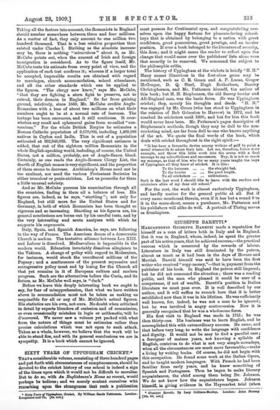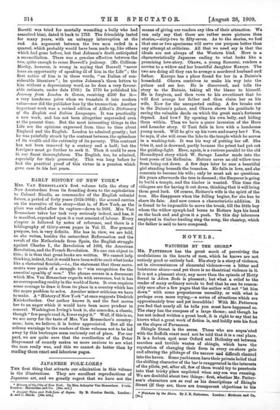GIUSEPPE BARETTI. , MARCANTONIO GIUSEPPE BLEETTI made 3 reputation for himself
as a man of letters both in Italy and in England. But it was in England, where, indeed, he spent the greater part of his active years, that he achieved success,—the practical success which is measured by the rewards of labour. Literature in Italy was still dominated by the patron, almost as much as it had been in the days of Horace and MartiaL Baretti himself was said to have been the first writer who received "copy-money,"—that is, payment from the publisher of his book. In England the patron still lingered; but he did not command the situation ; there was a reading public, and the man who pleased it could be sure of a competence, if not of wealth. Baretti's position in Italian literature we must pass over. It is well described by our author, and it will suffice to remark here that it is better established now than it was in his lifetime. He was sufficiently well known, for, indeed, he was not a man to be ignored ; but he was involved in angry controversies. Now it is generally recognised that he was a wholesome force.
MS first visit to England was made in 1751; he was then thirty-one. His business was to learn English, and he accomplished this with extraordinary success. He came, and that before very long, to write the language with confidence and dignity. It would not be easy to find a parallel case ; a foreigner of mature years, not knowing a syllable of English, contrives to do what is not very simple nowadays, when all the circumstances are much more favourable,—make a living by writing books. Of course, he did not begin with this occupation. He found some work at the Italian Opera, and he taught modern languages. With French be bad been familiar from early years, and he knew something of Spanish and Portuguese. Then he began to make literary acquaintances, the chief among them being Dr. Johnson. We do not know how the acquaintance began. Johnson himself, in giving evidence in the Haymarket trial (when
• Giuseppe Boretti. By Laery Collison-Morley. London: John Murray DOB. 65. net]
Baretti was tried for mortally wounding a bully who had assaulted him), dated it back to 1753. The friendship lasted for many years, with an unhappy interruption at the end. An argument between the two men ended in a quarrel, which probably would have been made up, like others which had gone before, but that Johnson's death anticipated a reconciliation. There was a genuine affection between the two, quite enough to rouse Boswell's jealousy. (Mr. Collison- Morley, however, is wrong in saying that Boswell "never loses an opportunity of speaking ill of him in the Life" ; the first notice of him is in these words, "an Italian of con- siderable literature " ; he quotes Johnson's three letters to him without a depreciatory word, as he does a very favour- able estimate, under date 1768.) In 1770 he published his Journey from London to Genoa, receiving £600 for it— a very handsome price when we translate it into modern value—nor did the publisher lose by the transaction. Another important work was a revised edition of Alfieri's Dictionary of the English and Italian Languages. It was practically a new work, and has not been altogether superseded even at the present time. But the most interesting things in the Life are the opinions expressed from time to time about England and the English. London he admired greatly ; but he was painfully struck by the contrast between the splendour of its wealth and the extremity of its poverty. This contrast has not been removed by a century and a half; but the foreigner must go further to seek it. Then it could be seen in our finest thoroughfares. The English, too, be admired, especially for their generosity. This was long before he had the practical proof of this virtue in a pension which gave ease to his last years.







































 Previous page
Previous page